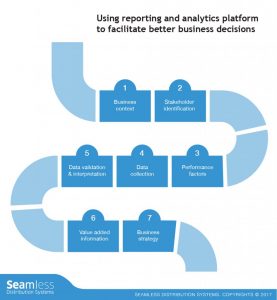Are you here to learn whether you need a data analytics and reporting platform? Have a look and try to answer these questions before you make a decision!
How do you measure success?
Is it when a product or a feature is successfully developed and rolled out in the market?
Or is it when the product starts getting “accepted” and adopted by your target audience?
Or is it when your product starts earning you a positive return on your investment?
And how do you plan for growth?
Do you know how many customers does your business have?
Do you know how many clients are inactive or left your business along the way and why?
If any one of these questions are relevant to you then it’s time for you to think about investing into a data analytics and reporting platform for your business.
Whether you are a service provider operating in a B2B or a B2C market, with a wide network of sales agents or a few selected resellers, offering multiple physical and electronic products or products catering to a specific niche, it is vital for you to measure success to improve business performance.

Explaining data and why is it important
To climb the ladder of success and bring sustainable growth to your company, a relevant strategy is required. A competitive strategy cannot be made without the backing of factual information. For example, a service provider aspiring to increase countrywide sales through sales enablement of agents needs to, at a minimum, know the agent hierarchy, past and current sales performance, reasons for failure in making a sale along with factors that motivate agents to perform better. A well-informed strategy cannot be formulated without this information. It is, therefore, critical to have intelligent and comprehendible data at hand to drive a proactive decision-making process.
Data vs. Information
Data in itself is nothing more than facts and figures about a service provider’s business operations. Data could be collected for both internal and external business processes through a range of activities. If not applied in a context, it has no inherent value. Data becomes information when it’s timely, accurate and specifically for a purpose, giving it inferable meaning. In essence, raw data that has been processed and interpreted to turn it into value added information, helps service providers make educated and impactful business decisions.
The importance of data and information cannot be stressed more, but what’s even more important is to create actionable strategies from that data.
Advantages of a robust analytics and reporting platform
Having an across-the-board analytics and reporting platform provides you the flexibility to collect data according to your required inputs. A service provider can use this platform to extract data based on multiple inputs like number of sales transactions, value of sales over time, regional sales and targets, active and dormant sales agents etc. based on the specific business needs.
A platform’s capabilities are not only limited to generating lists based on input factors, in fact data filters are in place to enhance the reports that are being produced. To take an example, a powerful reporting platform enables you to view the top performing sales agents in one particular region or to view the list of dormant agents based on region or time or even both! An even better report would be to identify the lowest performing agents in a region. This information can be used to create action/campaigns to reward them if they perform better through a campaign management system.
Features like intelligent alerts notify the sales agent about his performance against a set target and send an alert to the supervisor about his subordinate’s performance, changing the way people perform their jobs and making business faster and more competitive.
Another distinguishing feature of a must-have analytics and reporting platform is that reports can be accessed and used by all the key decision makers. This includes the front-end staff (like sales agents, resellers or distributors) as well as sales managers along with head of departments and C-level executives. Level of visibility of information in these reports can be defined based on user roles. Not only are these reports accessible for various types of users but they’re also available over multiple channels for ease of access. Audience or users of these reports can choose a basic or advanced medium according to their requirement. Mediums or channel options include web portal, mobile application, USSD menu and SMS request etc.

The key to success and performance growth, therefore, is being able to answer these vital questions about your company through the help of an analytics and reporting platform. SDS integrates powerful reports and analytics into every product, giving maximum value to its clients. Providing custom-built reporting platform along with standard reports that come with various products, SDS has the ability to capture real-time data and turn it into insightful information. We are always on a lookout to align our processes according to our client’s business needs, to help them create strategies and make well-informed business decisions.



